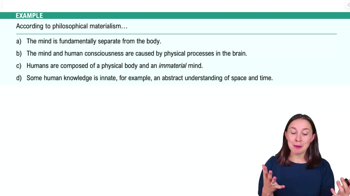Table of contents
- 1. Introduction to Psychology1h 43m
- 2. Psychology Research2h 20m
- 3. Biological Psychology2h 41m
- 4. Sensation and Perception28m
- 5. Consciousness and Sleep32m
- 6. Learning41m
- 7. Memory34m
- 8. Cognition37m
- 9. Emotion and Motivation35m
- 10. Developmental Psychology33m
- 11. Personality48m
- 12. Social Psychology41m
- 13. Stress and Health41m
- 14. Psychological Disorders44m
- 15. Treatment47m
1. Introduction to Psychology
What is Psychology?
Struggling with Psychology?
Join thousands of students who trust us to help them ace their exams!Watch the first videoMultiple Choice
The process of objectively examining and measuring one's own thoughts and mental activities is known as
A
an out-of-body experience.
B
a near-death experience.
C
objective introspection.
D
dualism.
 Verified step by step guidance
Verified step by step guidance1
Understand the concept of introspection: Introspection is the process of examining one's own conscious thoughts and feelings. In psychology, it is a method of self-observation and reporting of conscious inner thoughts, desires, and sensations.
Differentiate between objective and subjective introspection: Objective introspection involves examining and measuring one's own thoughts and mental activities in a structured and unbiased manner, whereas subjective introspection may involve personal biases and interpretations.
Identify the key characteristics of objective introspection: It requires a systematic approach to self-examination, often involving specific techniques or guidelines to ensure that the observations are as unbiased and accurate as possible.
Consider the historical context: Objective introspection was a method used by early psychologists, such as Wilhelm Wundt, who is often considered the father of modern psychology. He used this method to study the structure of the mind.
Relate the concept to the given options: Compare the definition and characteristics of objective introspection with the other options provided (out-of-body experience, near-death experience, dualism) to understand why objective introspection is the correct answer.

 1:53m
1:53mWatch next
Master Intro to Psychology with a bite sized video explanation from Hannah Gordils
Start learningRelated Videos
Related Practice
































